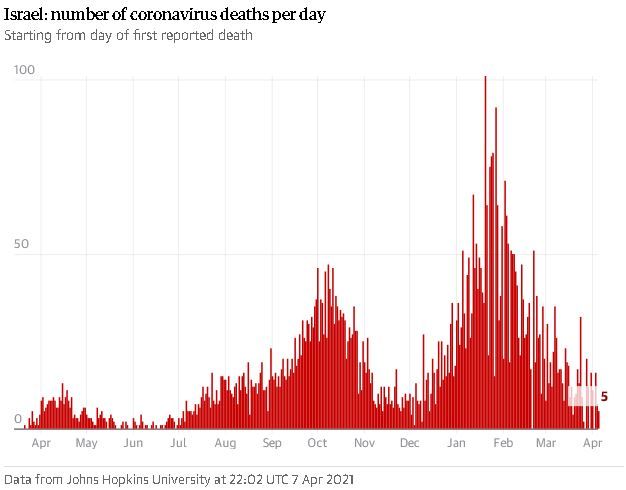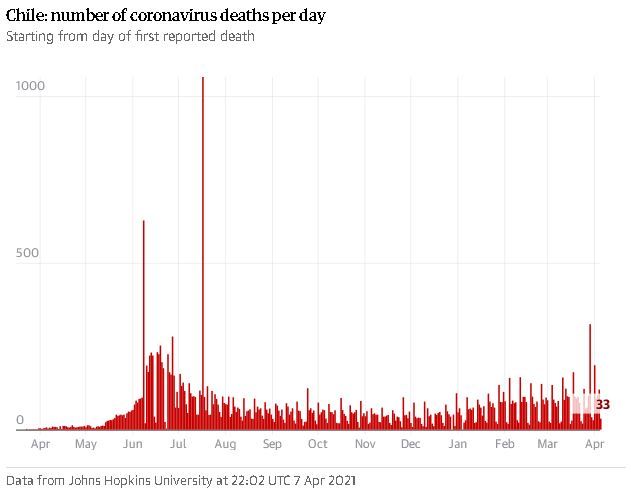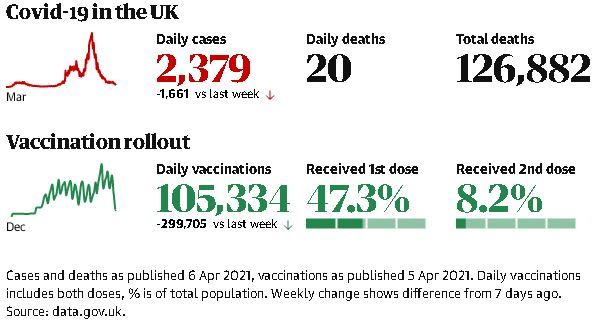
Israel and Chile both led on Covid jabs, so why is one back in lockdown?
As mass vaccination programmes take hold around the world, some countries have begun to get on top of the virus while others have continued to struggle. Two countries that have streaked ahead with immunisations are Israel and Chile, but as Israel edges back to a new normal, Chile has been plunged back into lockdown. Can the UK and other countries repeat Israel’s success and avoid the setbacks of Chile?
What is happening in Israel?
Israel has recorded dramatic falls in rates of infection, hospital admissions and deaths after running what was the world’s fastest Covid vaccination campaign. The country of 9 million people has administered two shots of the Pfizer/BioNTech vaccine to more than half its population. Daily life has returned almost completely to a pre-pandemic situation, with shops, hotels, concerts and cinemas open again. That said, restrictions are still in place, such as the need for face masks outside the home and limits on gatherings indoors.
An analysis by Eran Segal, a computational biologist at Israel’s Weizmann Institute of Science, reported that since a January peak in infections, the country had seen daily drops of 96% in cases, 90% in critically ill patients and 85% in deaths. According to health ministry statistics, daily infections have plummeted to the low hundreds – a massive decline since January, when there were 10,000 confirmed infections a day at one point. On Tuesday, the total number of active cases was roughly half that figure.

What is happening in Chile?
Chile is in the enviable position of having vaccinated faster than any other country in the Americas. More than a third of the country’s 18 million people have received at least one shot of either Pfizer/BioNTech or China’s Sinovac Biotech vaccine. However, cases have soared to the point of overwhelming the health system and strict lockdown measures are back in place.
What went wrong?
The speedy vaccination programme appears to have instilled a false sense of security that led the country to ease restrictions too soon without people appreciating the ongoing risks. The country reopened its borders in November and in January introduced permits for Chileans to go on summer holiday. Without strict controls on people entering the country, and the lack of an efficient contact-tracing system, travellers may have brought infections back into the country that were not picked up.
The virus would have had more chance to spread when the schools reopened along with restaurants, shopping malls, casinos, gyms and churches. With transmission rates now so high in the country, a far greater proportion of the population will need to be vaccinated to get on top of the epidemic.

Are the two countries comparable?
Israel’s case has a key difference to that of Chile’s in that it has exclusively administered Pfizer/BioNTech vaccine, whereas Chile is using Pfizer/BioNTech and Sinovac Biotech shots. It is unclear what difference, if any, that may have, but the Pfizer/BioNTech vaccine has been one of the strongest performers in clinical trials. Other differences between the countries – with vastly different societies and demographics, and possibly different virus variants in circulation – can also make comparisons misleading.
It may also be a question of time for Chile. While Israel is enjoying low infection rates now, the effect of the vaccine appeared to have taken longer to establish itself than first thought. In fact, the country suffered its worst rise in infections during the pandemic even after its vaccine drive was in train, with a strict and weeks-long lockdown imposed. That lockdown, similar to the one just put in place in Chile, will also have had an effect on infection rates.
Can the UK achieve what Israel has done?
The UK’s vaccination programme has been a rare highlight in an otherwise disappointing response to the crisis. Having secured early deals for vaccines from multiple manufacturers, the country started inoculations in December and ramped up rates into the spring. More than half of the adult population has now received at least one shot of either the Pfizer/BioNTech or Oxford/AstraZeneca vaccine, with coverage standing at more than 90% in the most vulnerable over-70s.
But the UK can easily blow it. Prof Chris Whitty, England’s chief medical officer, has said there will definitely be another surge in coronavirus when the UK comes out of lockdown. What is unclear is how bad the resurgence will be and when it will peak. Documents released on Monday by the government’s Sage experts suggest a third wave could peak in late July or August, with one pessimistic but plausible scenario anticipating a situation as severe as that experienced in January when half of all UK Covid deaths occurred. A major driver for that bleak outcome would be if the AstraZeneca vaccine turns out to be less effective at reducing infection, limiting its impact on the spread of the disease.

Difficulties over vaccine supply already threaten to slow the UK’s immunisation programme and scientists modelling the epidemic say that if a slower rollout is not balanced by a slower relaxation of restrictions, we will see more hospital admissions and deaths in any further wave.
Whether the UK can emulate Israel’s apparent success comes down to multiple factors. It is unclear how big a part is played by the vaccines used. Outbreak modellers on Sage assume that the Pfizer vaccine is more effective at preventing infections – and so reducing spread of the virus – than the Oxford/AstraZeneca vaccine. But there is little real-world data on the potency of the AstraZeneca vaccine when two shots are given three months apart, as is the case in the UK. The initial picture is that the delay improves the immune response, but the impact in the real world is unclear.
Differences in the vaccines are only one factor though. Unlike Israel, the UK is a global travel hub. This makes it much tougher to drive cases down to very low levels without strong – and highly disruptive – protection at the borders. This means cases are likely to be higher when the UK eases restrictions, meaning the epidemic could swiftly pick up again in the millions of people who have not been protected by vaccine.
Both Israel and the UK need to address differences in cultural behaviour, access to vaccines, housing density and vaccine hesitancy. Israel turned to free pizza and beer to encourage younger people – who are less at risk from the virus – to have the vaccine and similar enticements might work in the UK. Patterns of vaccine coverage in the UK show that the immunisation programme could easily result in a patchwork of high and low vaccination areas, with the disease more under control in richer regions and persisting in the more deprived areas.











